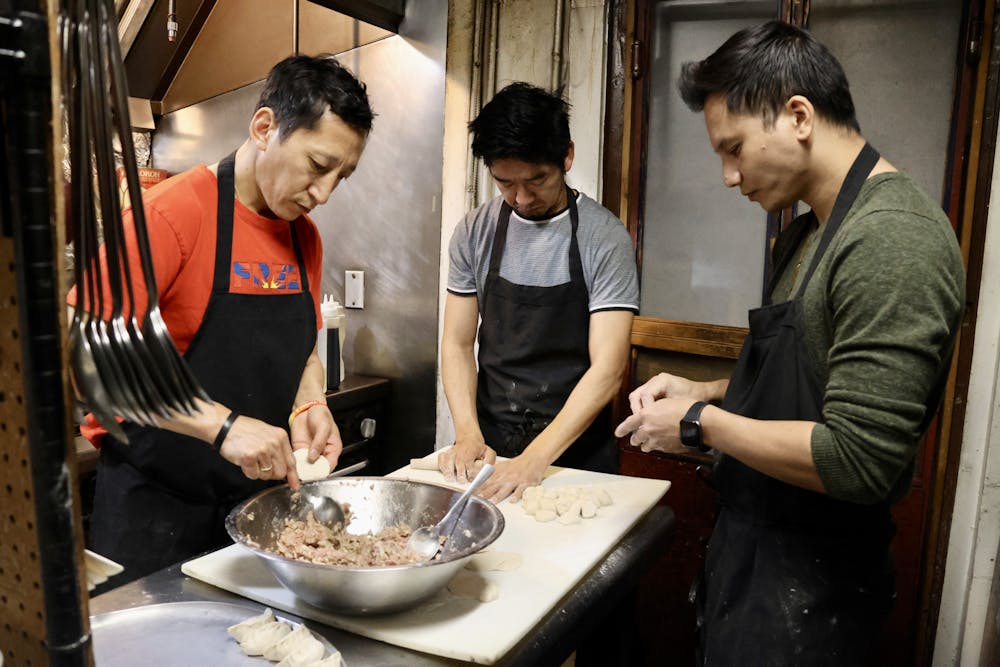BLOOMINGTON, Ind. – Tucked within Bloomington’s iconic Fourth Street lies a small, white house rich with cultural history and delicious food.
As Pema Wangchen steps into his restaurant, he passes the wooden sign that stands before the entrance. A yak is painted in front of snowy mountains. Below it a banner reads “Anyetsang’s Little Tibet Restaurant,” with flags of the United States, Tibet, India and Thailand in each corner.
Wangchen heads to the kitchen to start his day, preparing hundreds of Tibetan-style native teas, soups and momos — a type of steamed dumpling.
As the first customers arrive for lunch, Wangchen greets them with menus and a warm smile.
While many recognize Wangchen’s friendly face, few know about the trials and tribulations that led to where he is today.
Before owning his restaurant in Bloomington, Wangchen was born and raised in Chinese-occupied Tibet.
As a child, he was sent away from his home country with a group of Tibetan refugees to pursue opportunities for a better life.
His journey led him to Nepal, India, and eventually the United States, where he continued to travel before finally settling in Bloomington. His resume lists roles as a restaurant owner, a Buddhist monk and a luggage carrier for the Dalai Lama.
Today, he shares his experience as a way to educate locals on the hardships his people have faced, and to share his pursuit of lifelong happiness.
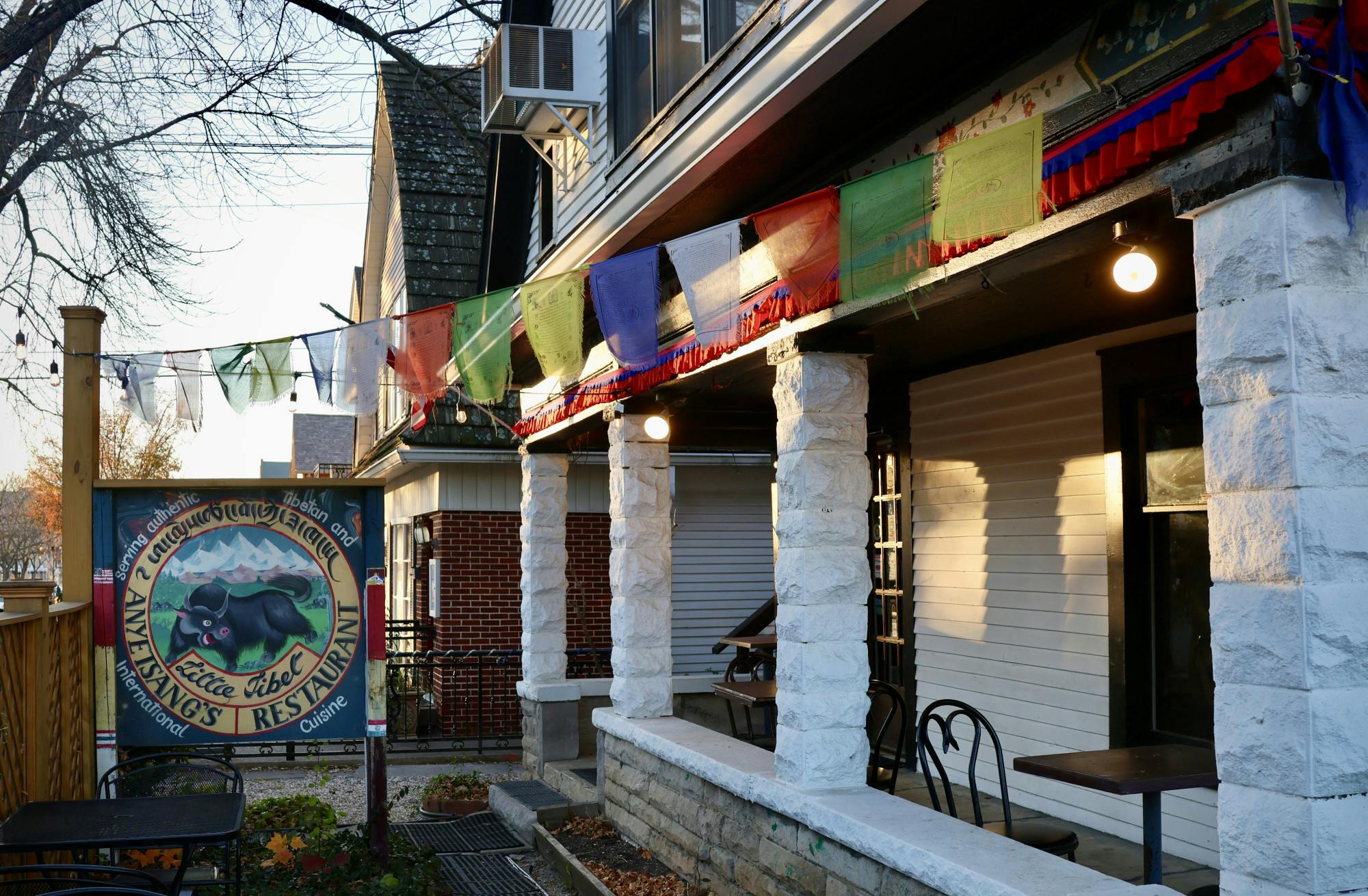
Anyetsang’s Little Tibet Restaurant sign stands before the entrance Nov. 14, 2023, with Tibetan prayer flags of red, green, blue, yellow and white hanging above, each color representing a different earthly element. The original owner installed the sign himself, and to honor his legacy, current owner Pema Wangchen chose to keep the sign.
Early Years In Tibet
Born in 1978, Wangchen grew up with his family in a Tibetan region between the Himalayan Mountains called Kham, on the southeastern side of the country.
After the Chinese Communist regime seized control of Tibet in 1950, much of the country was destroyed. The regime stripped Tibetans of their rights, their culture, and their religion.
Although he was born well after the invasion, Wangchen still felt its catastrophic effects.
“There is almost nothing over there,” Wangchen said. “Just eat, sleep, eat, sleep.”
His parents worked hard to provide for their eight children, but it was no easy task. Wangchen’s journey to escape Chinese rule began at the age of 12 when his parents sent him to India with 45 fellow Tibetans. They trekked through the Himalayan Mountains for 33 days, including parts of Mount Everest.
Upon reaching Kathmandu, Nepal’s capital, the group split into two buses. The Chinese military captured Wangchen’s bus, leading to a brutal three-day detention in jail. After he was released, he continued his journey to India, where he ultimately found freedom with his fellow Tibetans.
Life in India
For 11 years, Wangchen served as a Buddhist monk at the Sera Jey Monsastery in southern India. The monastery was originally located in Tibet; however, after Chinese troops destroyed Sera Jey in 1959, the monastery was rebuilt in India.
Wangchen resided at the monastery with his older brother, studying Buddhist philosophy and cultural practices. While he enjoyed his time as a monk, he wanted to do more.
“Life at the temple was a very good life,” Wangchen said. “But it was just my life. I wanted to do something for my mom and dad.”
Like many Tibetan Buddhists, Wangchen and his parents had a lifelong dream of meeting the Dalai Lama.
To help fulfill his parent’s dream, Wangchen left his life in India behind and moved to the United States to financially support his family.
His brother loaned him the money for his travels, and Wangchen took yet another journey — this time, much farther from home.
Coming to America
Wangchen arrived in New York City in the summer of 2003. He said the culture shock was undoubtedly the most difficult part of adjusting to his new life.
“I didn’t speak English,” Wangchen said. “I only knew ‘thank you.’”
Wangchen lived with friends who showed him the ropes of the city and American culture. He found work as a dishwasher in a Chinese restaurant in Cherry Hill, New Jersey.
The majority of the money he earned was not for personal use, but instead went towards paying back his brother for his passport and visa. Once he paid the loan off, Wangchen sent his earnings back to his parents in Tibet.
Wangchen encouraged his parents to put the money towards fulfilling their ultimate dreams: to meet the Dalai Lama. With Wangchen’s financial help, his parents were able to accomplish their goal and meet the spiritual leader in person.
Wangchen said his parents felt extremely blessed by the opportunity and were forever grateful for the sacrifices their son made for them.
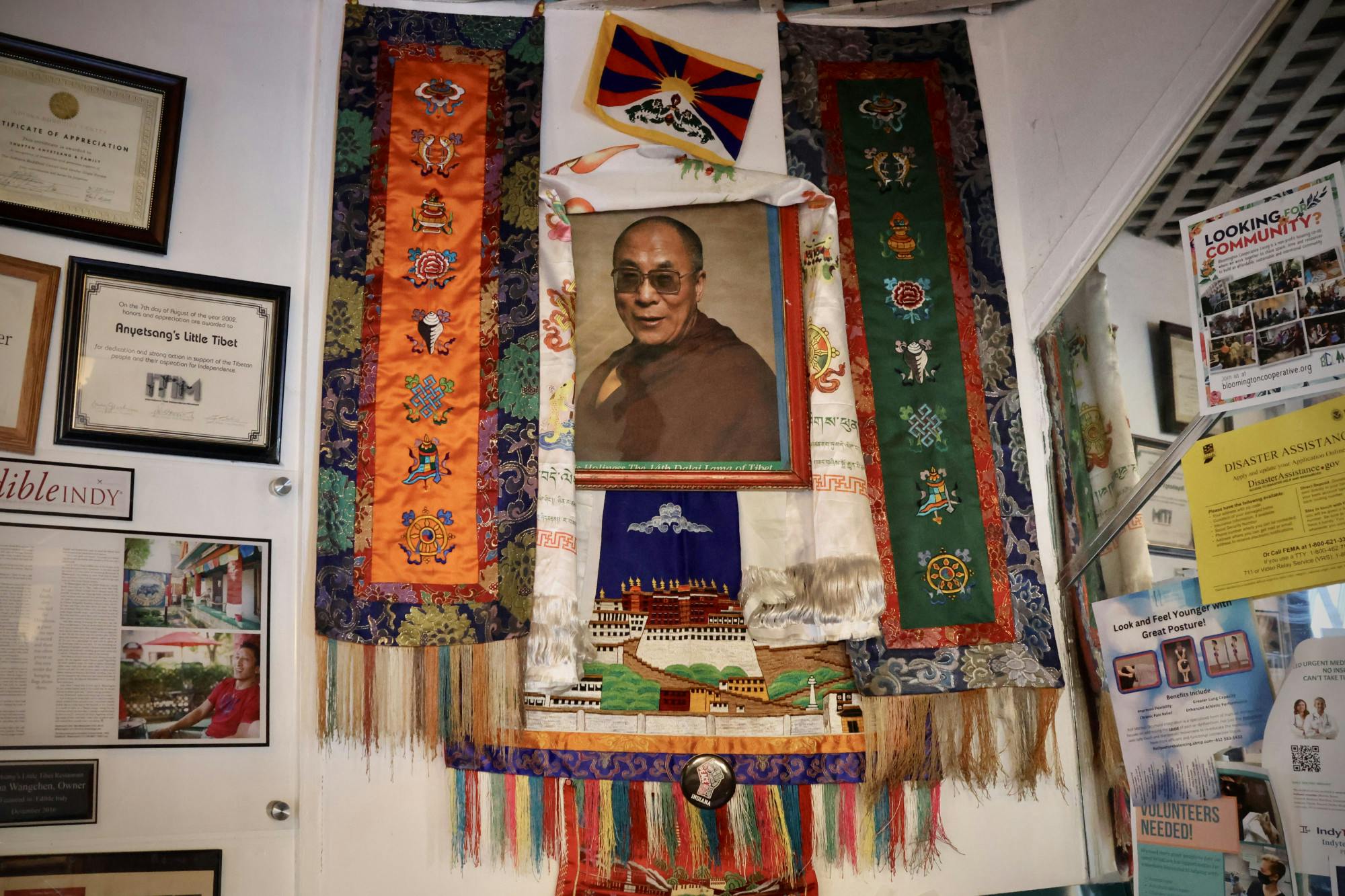
As the spiritual leader of Tibetan Buddhism and the Tibetan people, a photo of the Dalai Lama is pictured Nov. 14, 2023. Wangchen decorated each wall of the restaurant with prayers and sayings of the Dalai Lama to honor his teachings.
Wangchen lived in New York City for about eight years. He traveled around the country working various jobs until he got a call from a close friend, prompting him to move to Indiana.
Planting roots in Bloomington
In 2012, Wangchen’s close friend told him a small Tibetan restaurant in Bloomington, Indiana, was planning to close. The restaurant’s owner, Thupten Anyetsang, was Wangchen’s distant relative. After running Little Tibet for 25 years, Anyetsang wanted to retire.
Although Wangchen was not close with Anyetsang, he wanted to see the restaurant for himself. To Wangchen, keeping Little Tibet alive was a way to spread his culture.
For decades, Tibetan people have protested against the oppression of the Chinese government in various ways. Some take peaceful approaches such as marches, vigils and sit-ins. Others employ more extreme methods of resistance like self-immolation, a deeply spiritual Buddhist practice where Tibetans set themselves on fire in protest.
“Tibetan people sacrifice their lives for the freedom of independent Tibet,” Wangchen said. “I was just making money and enjoying life. But deep inside, I felt selfish.”
Wangchen visited the Tibetan restaurant in December 2012. Two months later Wangchen bought it.
“I wanted to own the Tibetan restaurant so I can share my story with young people,” Wangchen said. “A lot of people don’t know what Tibet is, but that’s my goal, to tell them.”
Little Tibet specializes in serving traditional Tibetan food, carrying on the former owner’s legacy. The restaurant also serves traditional Thai and Indian dishes Wangchen learned to cook when he arrived in Bloomington.
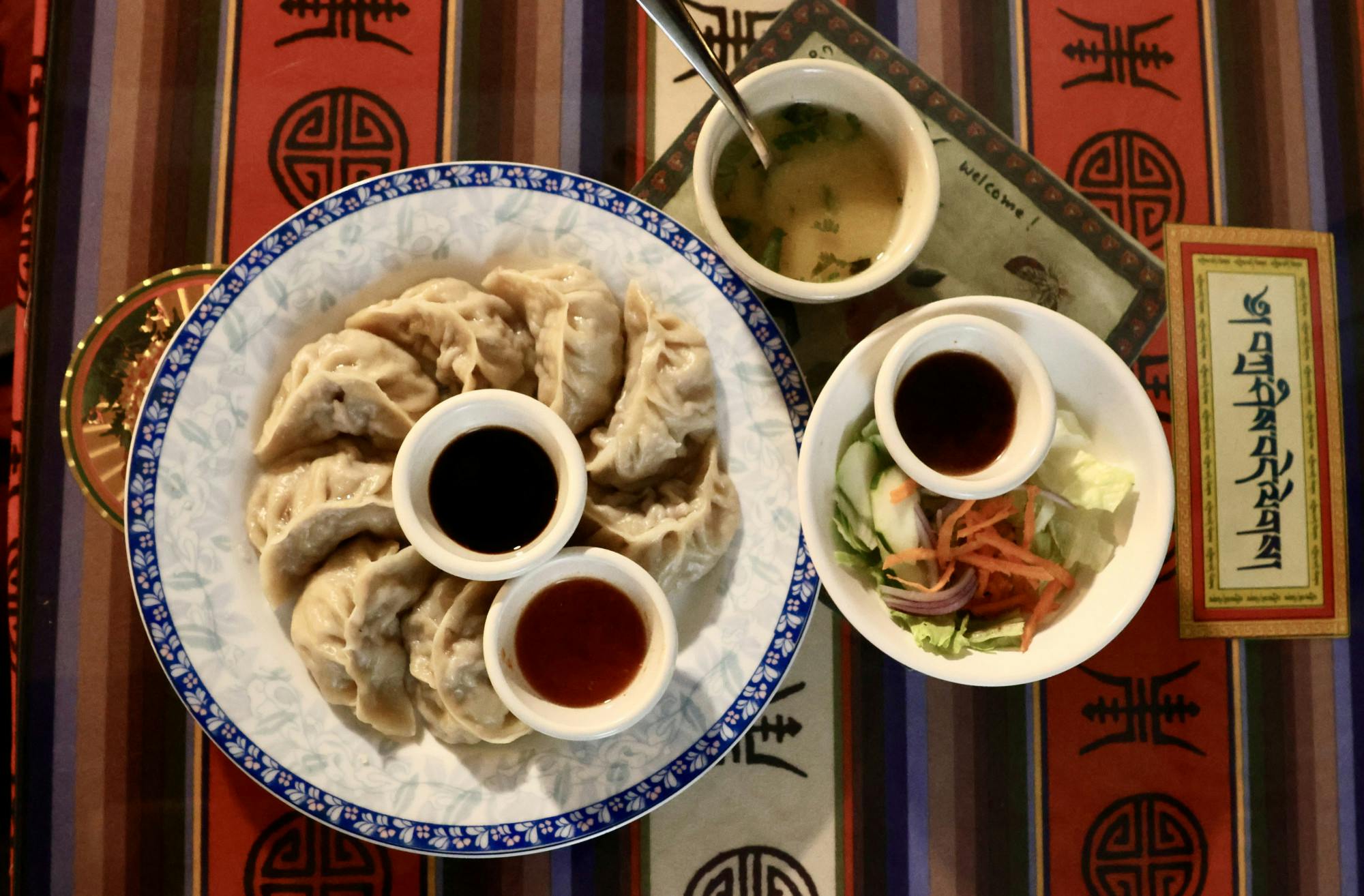
Tibetan-style momos, filled with seasoned ground beef and yellow onion, are served with complimentary salad and lentil soup Nov. 14, 2023. Wangchen said beef momos are the most popular dish on the menu.
Since taking over the restaurant, Wangchen has turned Little Tibet into a staple of the iconic international food scene in Bloomington. Wangchen’s work and his story have been featured in numerous publications, including Edible Indy magazine and the Big Ten Network’s television program, Campus Eats.
Pursuit of lifelong happiness
Now, 10 years later, Wangchen wears a “Free Tibet” t-shirt each day. He encourages his customers to observe the Tibetan flags and cultural decorations that adorn each wall.
Kunga Lhamo, a Tibetan server at the restaurant, wears a traditional Tibetan dress called a chupa while she works her shifts.
“I think this restaurant feels comforting for Tibetan people, but also for people who don’t know anything about Tibet,” Lhamo said, “Someone could just say ‘Wow this food is really good,’ or it could be the gates into learning about Tibet.”
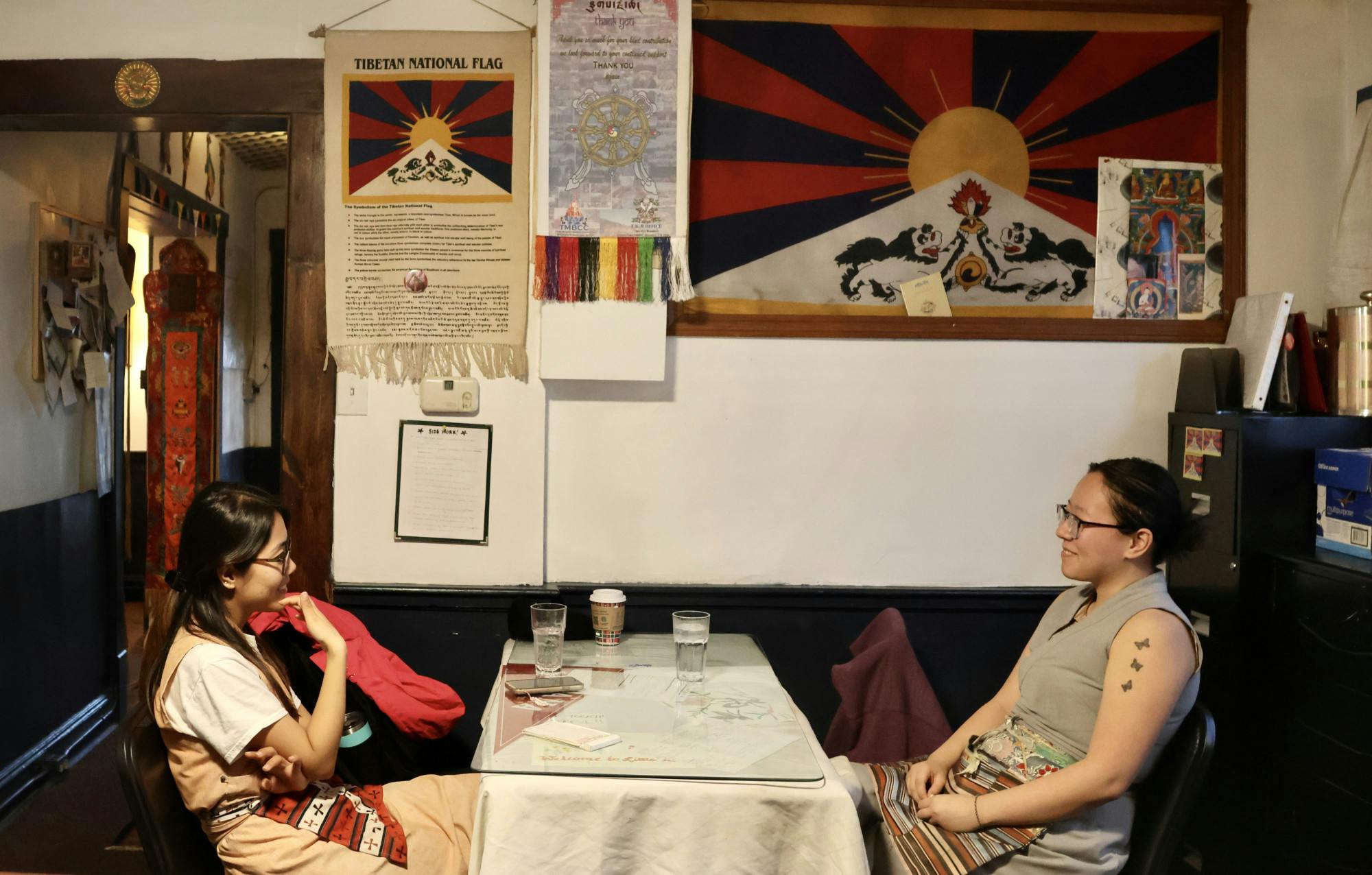
Servers Tenzin Bhuti (left) and Kunga Lhamo (right) are pictured in front of Tibetan flags as they await the dinner customers' arrival Nov. 14, 2023. Both Bhuti and Lhamo wore chupas, traditional Tibetan dresses.
Along the walls of the restaurant are pictures and shrines dedicated to honoring the Dalai Lama. Like his parents, Wangchen’s lifelong goal was to one day meet the Buddhist leader in person.
In 2016, the Dalai Lama visited Indianapolis during his tour of the United States. After being in contact with the Tibetan secret service, Wangchen volunteered to be the Dalai Lama’s personal luggage carrier.
“When the Dalai Lama showed up, I was crying, I couldn’t believe it,” Wangchen said. “It’s so emotional. We lost our country, we lost everything.”
Among all of the Dalai Lama’s teachings, the one Wangchen tries to incorporate in his own life most is the pursuit of lifelong happiness. For many years, Wangchen’s pursuit of happiness meant getting to see his family again after fleeing from Tibet.
For 22 years, he only communicated with his family through letters and the occasional phone call. After the Chinese embassy granted him a visa in 2015, Wangchen was finally reunited with his parents and siblings in his home country.
The moment he saw his father, Wangchen said he felt indescribable, immense joy.
“I’m running and I’m running, hugging him and my mom,” Wangchen said. “We both cried. All of my family, we cried together.”
Wangchen has returned to Tibet twice since relocating to the U.S.: once in 2015 and again in 2017. He keeps a scrapbook from his trips filled with photos of him smiling ear to ear with his immediate and extended family.
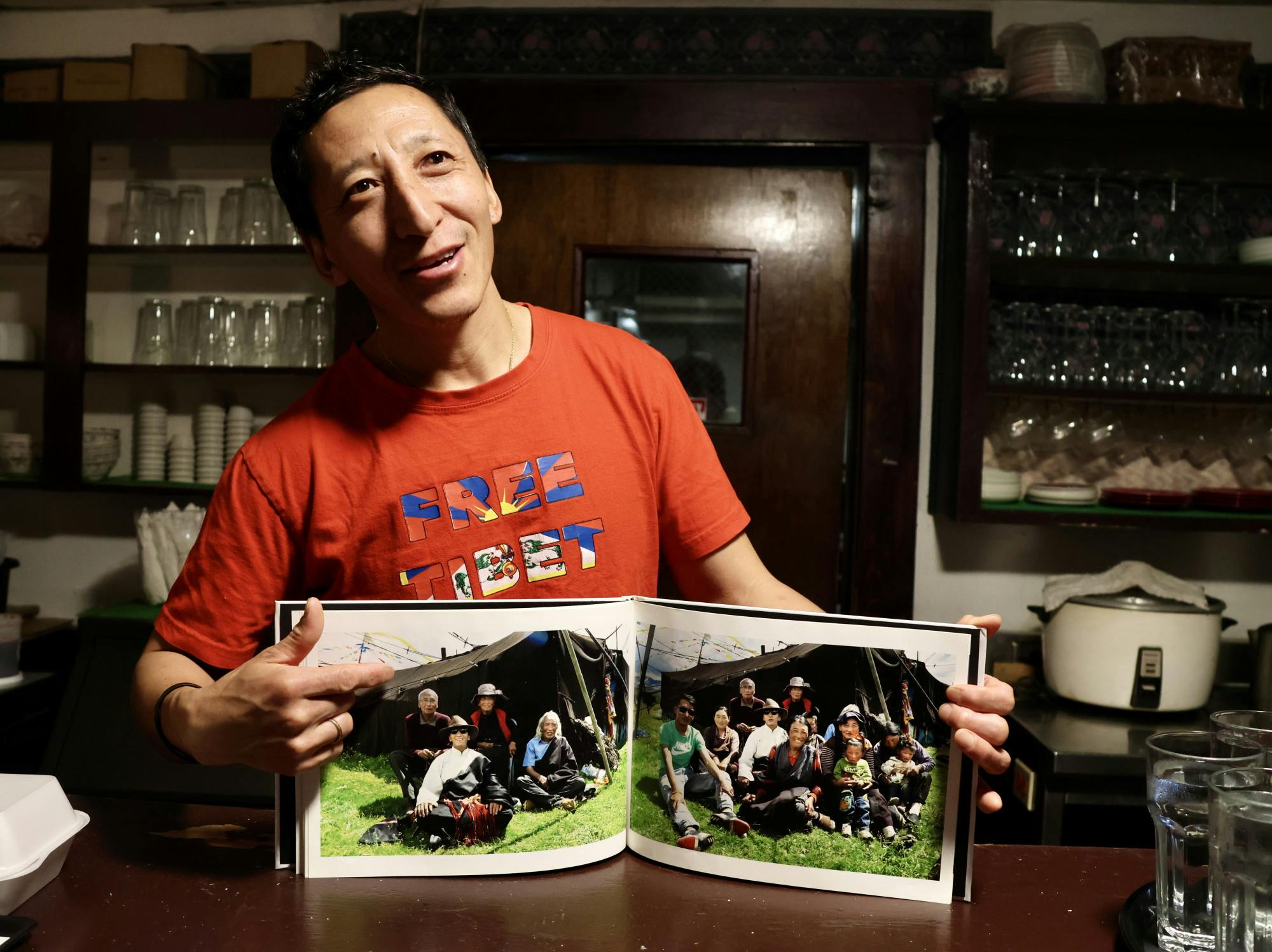
Pema Wangchen proudly presents a photo album of his family in his restaurant Little Tibet on Nov. 14, 2023. The photo album was from a 2017 family reunion in his home region of Kham.
Today, Wangchen uses his restaurant as a way to share his story, the story of Tibet and the importance of Tibetan freedom. Above all, Wangchen uses his platform to inspire locals to discover their own sense of lifelong happiness.
“I’m grateful that I can represent Tibet in my restaurant, I can share Tibet with the world,” Wangchen said. “I am thankful for the community in Bloomington. They are deep in my heart. I will always, always say thank you.”

